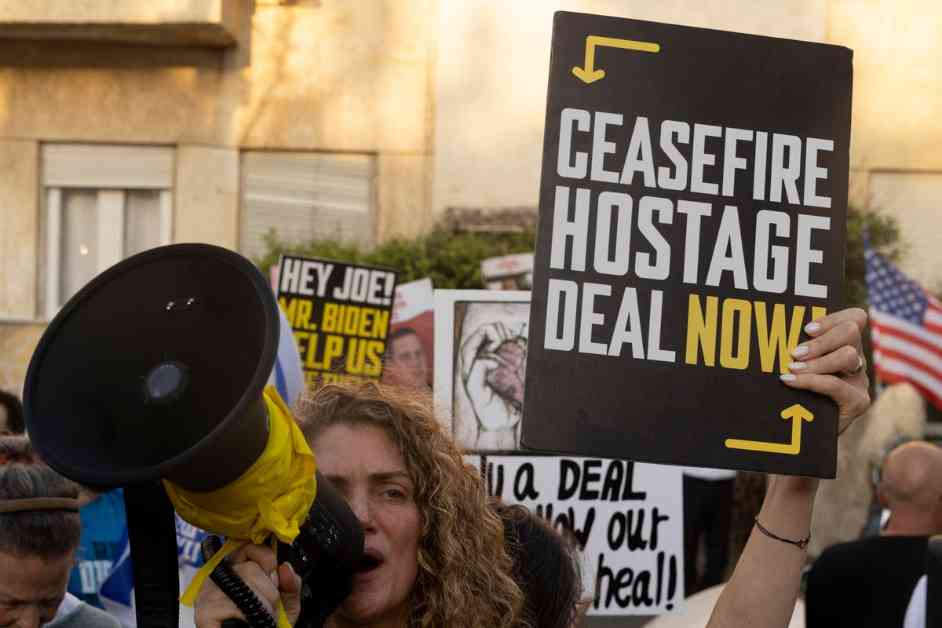The Israeli military successfully carried out an overnight operation in Gaza, recovering the bodies of six hostages who were taken by Hamas in an attack on October 7. The hostages were identified as Yagev Buchshtab, Alexander Dancyg, Avraham Munder, Yoram Metzger, Nadav Popplewell, and Haim Perry. While the exact circumstances of their deaths were not disclosed, it is a tragic reminder of the ongoing conflict and the toll it takes on innocent lives.
Prime Minister Benjamin Netanyahu expressed his condolences for the loss of the hostages and vowed to continue efforts to bring back all Israeli hostages, whether alive or deceased. The recovery of the bodies comes at a crucial time as the United States, Egypt, and Qatar are working to negotiate a ceasefire agreement between Israel and Hamas, with the hope of securing the release of more hostages held by the militant group.
Challenges in Ceasefire Negotiations
Despite ongoing diplomatic efforts, Hamas is still believed to be holding approximately 110 hostages from the October 7 attack. The situation is further complicated by the fact that Israeli authorities estimate that a significant number of these hostages may have already lost their lives while in captivity. This grim reality underscores the urgency of reaching a resolution to the conflict and securing the safe return of any remaining hostages.
US Secretary of State Antony Blinken, who has been actively involved in the peace process, recently announced that Prime Minister Netanyahu has accepted a proposal to bridge the gaps in ceasefire negotiations. However, Hamas has yet to show a willingness to cooperate, prolonging the suffering of the hostages and their families. Blinken’s call for Hamas to engage in the peace process highlights the need for all parties to prioritize the humanitarian aspect of the conflict and work towards a sustainable solution.
Humanitarian Impact of the Conflict
The devastating toll of the conflict is evident in the staggering number of casualties on both sides. Hamas militants launched a brutal attack on Israel on October 7, resulting in the deaths of over 1,200 people, the majority of whom were innocent civilians. The indiscriminate violence perpetrated by Hamas has not only claimed the lives of numerous individuals but has also left families shattered and communities in mourning.
In response to the attack, Israel launched a retaliatory offensive that has resulted in the deaths of over 40,000 Palestinians, according to Gaza’s Health Ministry. While the exact breakdown of casualties is unclear, the sheer magnitude of the loss is a stark reminder of the human cost of the conflict. As the violence continues to escalate, it is imperative for all parties involved to prioritize the protection of civilian lives and work towards a sustainable peace agreement.
International Efforts for Peace
The international community has been actively engaged in efforts to facilitate a ceasefire and promote dialogue between Israel and Hamas. The United States, Egypt, and Qatar have played a crucial role in mediating negotiations and advocating for a peaceful resolution to the conflict. Despite the challenges and setbacks in the peace process, these diplomatic efforts underscore the importance of international cooperation in addressing complex conflicts and promoting stability in the region.
In light of the recent recovery of the hostages’ bodies, there is a renewed sense of urgency to address the humanitarian crisis in Gaza and work towards a lasting ceasefire agreement. The tragic loss of innocent lives underscores the need for all parties to prioritize the protection of civilians and uphold their obligations under international humanitarian law. As the peace process unfolds, it is essential for leaders on both sides to demonstrate genuine commitment to finding a peaceful resolution and preventing further loss of life.












